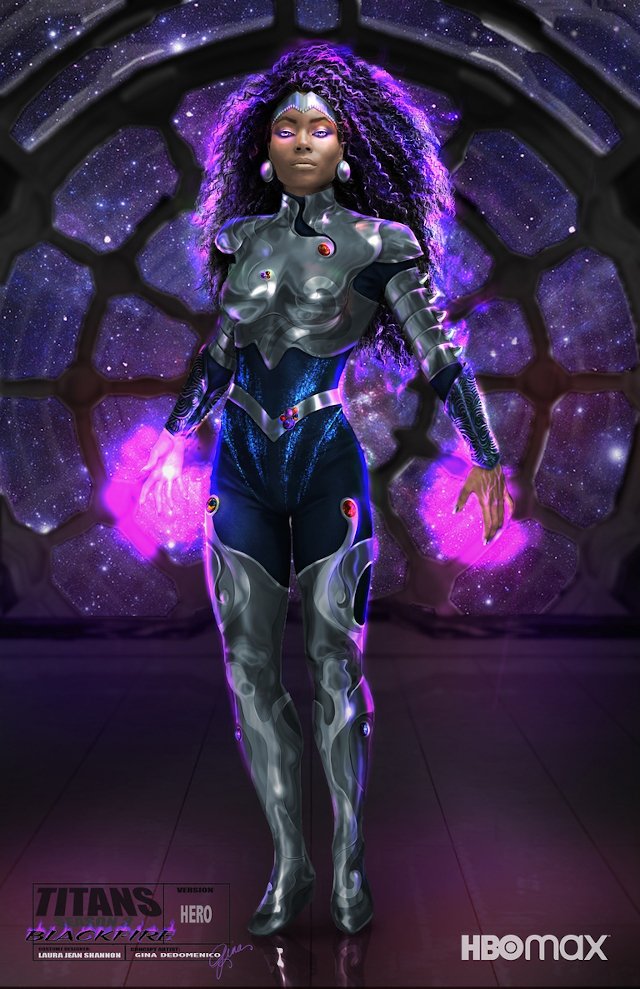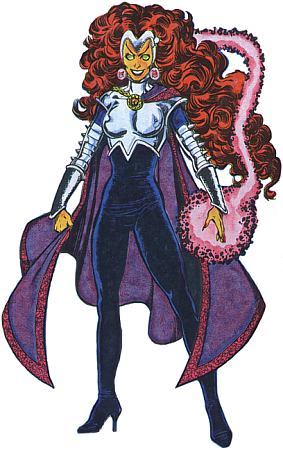

Lobdell also cleverly brings back Isabel, the stewardess who Red Hood Jason Todd chose not to date last time. Lobdell's Arsenal is such a goofball that it's like watching Starfire have a relationship with Changeling, which is weird (one would sooner imagine Starfire romantically involved with the late 1990s Arsenal than this guy) but the fact that they care for each other in a relatively straightforward and uncomplicated way is refreshing given, for instance, how fraught Superman and Wonder Woman's relationship is. If sudden, though, it works, in part because of the way Lobdell plays against type - Starfire takes the dominant, stoic (stereotypically male) role in the relationship (which arguably she did not have in New Teen Titans with Nightwing) while Arsenal is more doting and emotional. The move is a little sudden and one might wonder if it's at least in part due to the backlash Lobdell received for Starfire's incidental sexuality in the first volume. One interesting character bit is how Lobdell tries to deepen the relationship between Starfire and Arsenal in this volume. Other than to flesh out Starfire's twice-told origin, not much of consequence happens in this story. Also, Lobdell's four-part "Starfire" story lacks some suspense the Outlaws go to outer space, they battle Blackfire and the Blight, they win, they go home. It may be too slight, however I'd still argue the broad strokes of the story are the same. I appreciated this - just when I felt the story was too predictable, Lobdell goes against expectations just slightly. Lobdell does offer a good twist in making Blackfire Komand'r good, rather than bad the story plays to expectations in the first two parts, and then reveals Blackfire to be on the side of angels in the third. What I never wanted to see with the New 52 was someone trying again to tell "Great Darkness Saga," for instance, and having it come out poorly (which had been the case once before) in the same way, watching Starfire battle Blackfire again "for the first time" doesn't hold my interest as well as if Lobdell had given Starfire an entirely new origin, making the character his own. This is a problem endemic to the New 52 as a whole in an attempt to keep DC's new universe relatively like DC's old universe, a number of origins remained relatively the same, and that inevitably lead to telling the same stories over again. Lobdell has not such a far-reaching cast here, but neither did Red Hood and Arsenal look out of place fighting alien hordes alongside Starfire, and this suggests a trip to Azarath or Olympus would work equally well.īut in the broad strokes, Lobdell is telling a story that Wolfman and Perez already told, and that we've seen versions of in different media since then - Starfire returns to Tamaran, she fights her evil sister Blackfire, hilarity ensues. The strength of Titans was that with Nightwing, Starfire, Raven, Donna Troy, and the rest, Wolfman and Perez could easily pit the Titans against the HIVE, but also send them to the alien planet Tamaran, or the mystic dimension of Azarath, or pit them against the gods of myth. That's a comparison that might give some purists pause given Lobdell's controversial recreations of both Starfire and Arsenal, but it's apt. In this way, Red Hood and the Outlaws is largely reminiscent of Marv Wolfman and George Perez's New Teen Titans. This genre-bridging is not something that could be comfortably done with another Bat-book like Batgirl or Batwing.
#Blackfire new 52 series#
None of these stories feel out of place for the characters, and in this way Lobdell demonstrates the breadth of stories this series can tell.

Starfire begins with the Red Hood versus mobsters, then a "Night of the Owls" crossover, then a four-part trip to space, and then a run-in with Superman. The last volume of Red Hood saw the team take on undead ninjas and giant monsters the story was not "earthbound" in the "fighting crime in Gotham City" sense, but neither was it too far afield from what one might normally find among the Bat-titles. But Lobdell tells a familiar story, and despite a welcome tweak here and there, the book remains mostly predictable. 2: The Starfire demonstrates the versatility of this title in a way that ought to suggest good things going forward. Scott Lobdell's Red Hood and the Outlaws Vol.


 0 kommentar(er)
0 kommentar(er)
